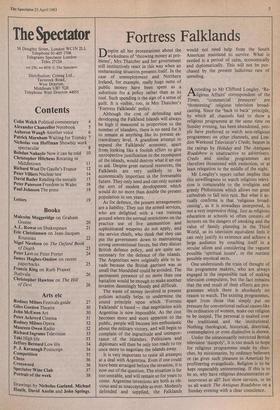Fortress Falklands
Despite all her protestations about the wickedness of 'throwing money at pro- blems', Mrs Thatcher and her government still instinctively react in this way when an embarassing situation presents itself. In the case of unemployment and Northern Ireland, for example, really huge sums of public money have been spent as a substitute for a policy rather than as its tool. Such spending is the sign of a sense of guilt. It is visible, too, in Mrs Thatcher's `Fortress Falklands' policy.
Although the cost of defending and developing the Falkland Islands will always be high if measured in proportion to the number of islanders, there is no need for it to remain at anything like its present ex- traordinary level. A grandiose attempt to expand the Falklands' economy, apart from looking like a foolish effort to give retrospective justification to the reconquest of the islands, would destroy what it set out to aid. Despite great natural resources, the Falklands are very unlikely to be economically important in the foreseeable future. They only need and can only sustain the sort of modest development which would do no more than double the present population in ten years.
As for defence, the present arrangements are a liability. They suit the armed services, who are delighted with a vast training ground where the normal restrictions on the practice use of live ammunition and sophisticated weapons do not apply, and the service chiefs, who think that they can pin the government down to maintaining strong conventional forces, but they distort British defence policy, and are quite un- necessary for the defence of the islands. The Argentines were originally able to in- vade because the British garrison was so small that bloodshed could be avoided. The permanent presence of no more than one battalion would be enough to make another invasion dauntingly bloody and difficult.
The waste of money involved in present policies actually helps to undermine the sound principle upon which 'Fortress Falklands' is based — that negotiation with Argentina is now impossible. As the cost becomes more and more apparent to the public, people will become less enthusiastic about the military victory, and will begin to complain of the ingratitude and unimpor- tance of the islanders. Politicians and diplomats will then be only too ready to try once more to negotiate the islands away.
It is very important to resist all attempts at a deal with Argentina. Even if one could have been arranged before the invasion, it is now out of the question. The situation is far too unstable, and will remain so for years to come. Argentine intentions are both as ob- vious and as unacceptable as ever. Modestly defended and supplied, the Falklands would not need help from the South American mainland to survive. What is needed is a period of calm, economically and diplomatically. This will not be pur- chased by the present ludicrous rate of spending.
According to Mr Clifford Longley, 'Re- ligious Affairs' correspondent of the Times, 'commercial pressures' are `threatening' religious television broad- casting. Since the 'back to back' principle, by which all channels had to show a religious programme at the same time on Sunday evening, has been abandoned, peo- ple have preferred to watch non-religious programmes on other channels, and Lon- don Weekend Television's Credo, beaten in the ratings by Holiday and The Antiques Roadshow is unattractive to advertisers. Credo and similar programmes are therefore threatened with extinction, or at least relegation to the middle of the night.
Mr Longley's report rather implies that this unwillingness to watch religious televi- sion is comparable to the h-religion and greedy Philistinism which allows our great cathedrals to fall into ruin. But what it ac- tually confirms is that 'religious broad- casting', as it is nowadays interpreted, is not a very impressive thing. Just as religious education at schools so often consists of lectures on the dangers of smoking and the value of family planning in the Third World, so its television equivalent feels it can only justify its existence and achieve a large audience by couching itself in a secular idiom and considering the vaguest possible 'spiritual issues', or the nuttiest possible mystical sects.
One understands the train of thought of the programme makers, who are always engaged in the impossible task of making television compulsive, but the fact remains that the end result of their efforts are pro- grammes which there is absolutely no reason to watch. The existing programmes, apart from those that simply put on pressure for conventional radical causes like the ordination of women, make out religion to be insipid. The personal is exalted over the traditional and the institutional. Nothing theological, historical, doctrinal, contemplative or even distinctive is shown.
Under the unnecessarily restricted British television `duopoly', it is too much to hope for religious programmes made by chur- ches, by missionaries, by ordinary believers or (as gives such pleasure in America) by profiteering evangelicals. Religion is to be kept respectably uninteresting. If this is to be so, why have religious documentaries or interviews at all? Just show services, or let us all watch The Antiques Roadshow on a Sunday evening with a clear conscience.










































 Previous page
Previous page